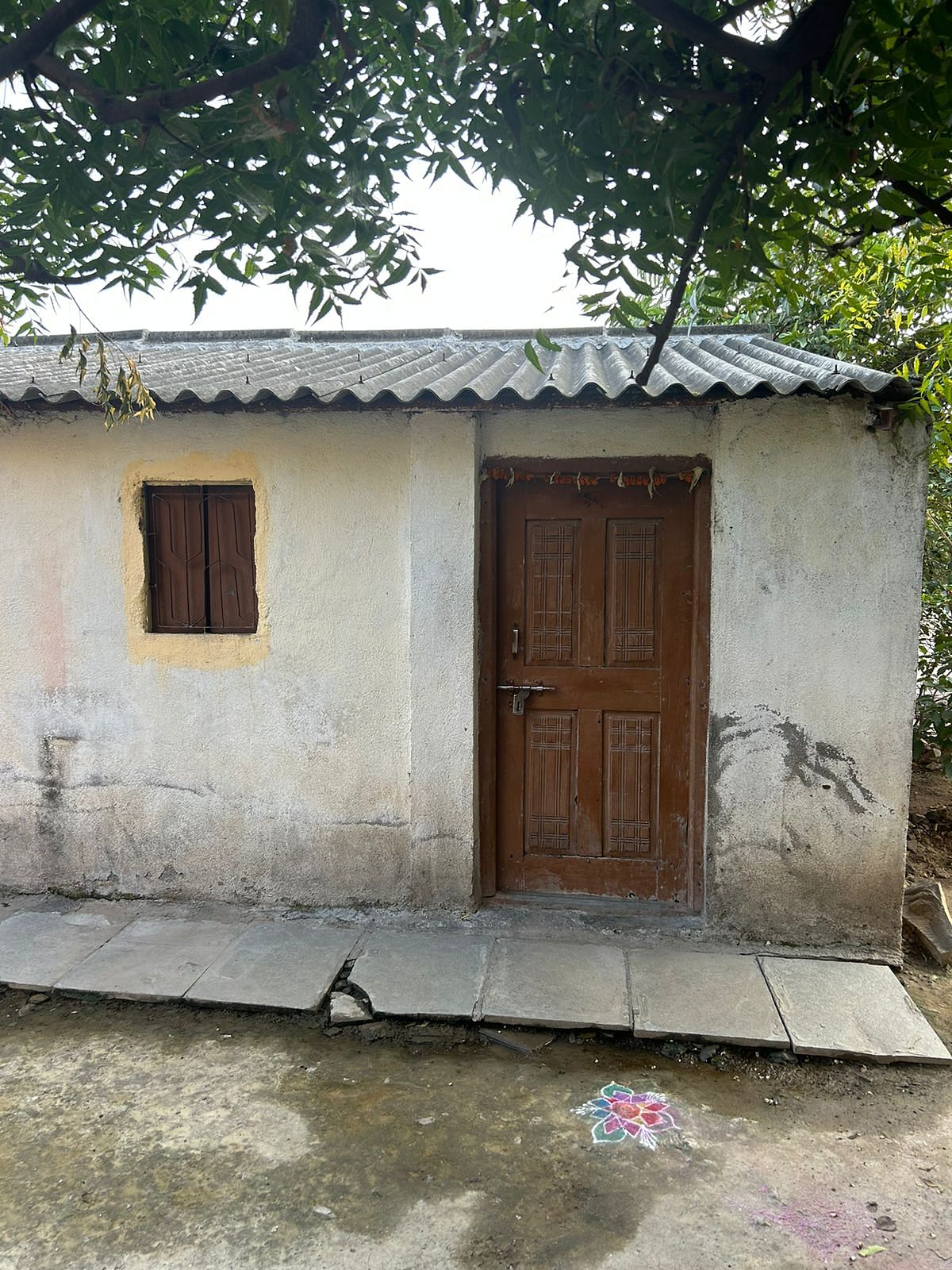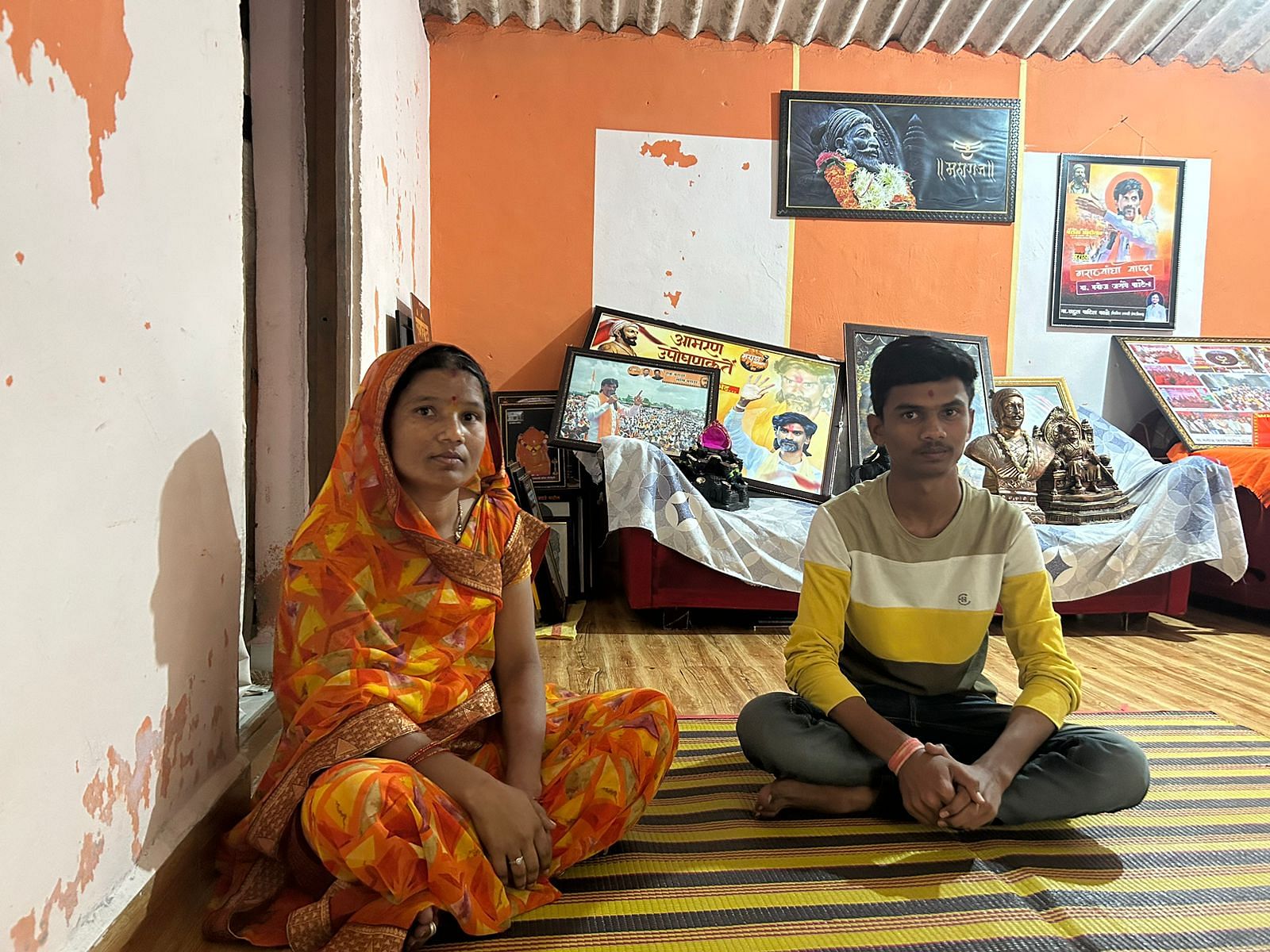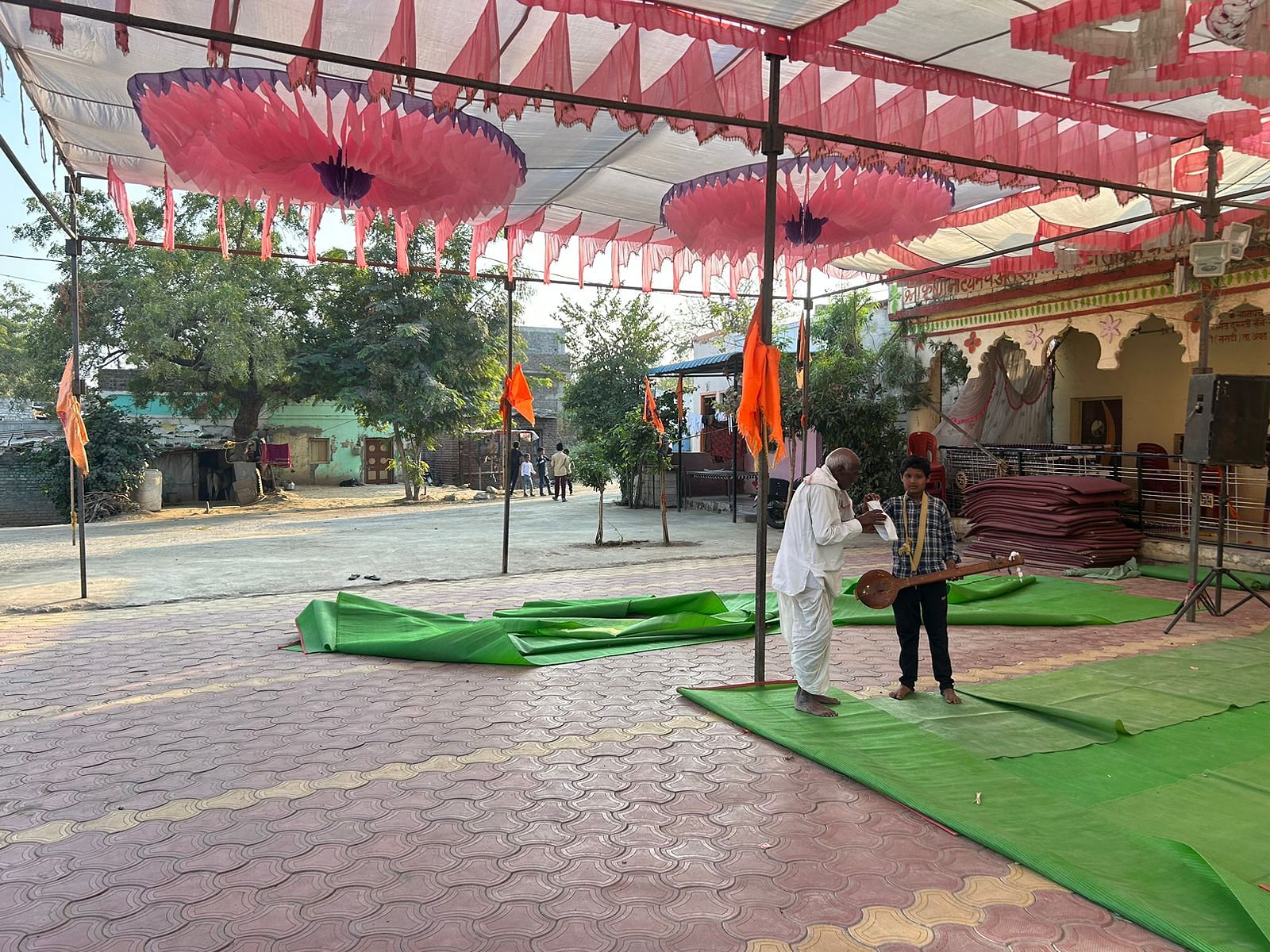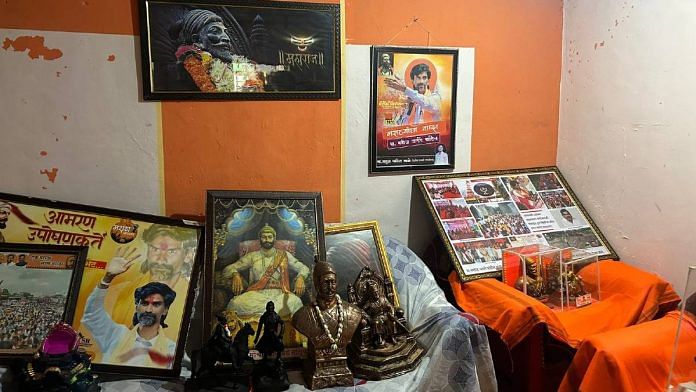Jalna: In Ankushnagar, a short walk from a sugar factory controlled by former minister Rajesh Tope, there’s a dusty road lined by tired-looking houses on either side. One of them, a small one-room house with a kitchen, is the home of Manoj Jarange-Patil, a small-time Maratha activist who has metamorphosed into the face of the community’s struggle for reservation.
His humble house here in Jalna district gives away signs of his overnight fame. There are just three pieces of furniture — a three-seater couch and two armchairs — all stacked next to each other and covered with statues, busts and photographs of Maratha warrior king Chhatrapati Shivaji Maharaj, as well as framed posters and newspaper articles of Jarange-Patil himself. A couple of them, proclaiming him to be a Maratha Yoddha (Maratha soldier), have already been hung on the wall, while most others are littered around the sparse furniture, waiting for their place in the modest home.
With just a small two-acre farm, 40-year-old Jarange-Patil, who is originally from Beed district’s Maturi village, doesn’t have much of his own. But, as he grows into the role of a pan-Maharashtra Maratha leader with his state-wide tours and rallies, organisational and financial help is pouring in from all quarters. It’s coming from six of his closest aides in Jalna district as well as from Maratha leaders across Maharashtra, say people in Antarwali Sarati — the village where he sat on a hunger strike and shot to fame when police lathi charged protesters there in September this year.
Demanding reservation for the Maratha community in government jobs and education, Jarange-Patil persisted with the hunger strike in Antarwali Sarati for 17 days and called it off only after Maharashtra Chief Minister Eknath Shinde personally visited him, along with a slew of ministers and senior politicians from the ruling coalition, and held a glass of water to his lips.
Jarange-Patil gave the government time till 24 October to fulfil his demand for a Maratha quota, after which he began another hunger strike. This time, he demanded that all Marathas be given reservation as Kunbis under the Other Backward Classes category. He called off this second phase of his protest only after eight days, giving the state government a 24 December deadline to meet his demand. The Shinde-led government has galvanised the entire administration in every district to find Kunbi records among Marathas and grant them caste certificates, setting a deadline of 2 January for itself. The demand for a separate Maratha quota is embroiled in a legal battle, with the Supreme Court having struck it down as unconstitutional.

“This was the 39th time my husband was on a hunger strike,” says Sumitra Jarange-Patil, Manoj’s wife. “This time, the cause gained momentum. So one fine day, he decided that he should tour Maharashtra, travel to other districts to spread the word. He doesn’t believe in politicians anymore and has no organisational backing. His friends from here are helping him.”
The six members of his core team are a group of people from Antarwali Sarati and the neighbouring villages. The group includes Pandurang Tarakh, the village sarpanch, Ramesh Tarakh, a doctor from Antarwali Sarati, Pradeep Solunke, a teacher from Chhatrapati Sambhajinagar (formerly called Aurangabad), and three farmers who are some of Jarange Patil’s oldest associates, according to villagers from Antarwali Sarati. The three are Shreeram Kurankar, Sanjay Katare and Dhananjay Duphake.
Also read: Shinde Sena moans, Pawar, Fadnavis wait and watch, as Bhujbal revives pre-arrest aggression
Jarange-Patil’s support system
Jarange-Patil’s six aides have remained at his side since the beginning of his hunger strikes and have been travelling with him across Maharashtra. They have helped him draw up a rough plan for his travels, zeroed in on the destinations where he should deliver speeches and tapped their entire network across the state to make arrangements for accommodation and food.
“People from different districts have been getting in touch with us, requesting us to plan a rally in their village. We consolidate all such requests and then map the tour. After that, we get in touch with our contacts there for logistical support. Many times, people who want us to hold rallies themselves offer to arrange for our lodging and boarding,” says Kurankar, a farmer from Kuran village in Jalna district.
Kurankar adds that none of the six has any political background. However, Solunke, the teacher from Chhatrapati Sambhajinagar, is an exception. Formerly a member of the Nationalist Congress Party (NCP), he was reportedly suspended from the undivided NCP in January for rebelling and contesting against the party’s official candidate from the Marathwada teachers’ constituency in the MLC polls. Solunke did not win the election.
At Jarange-Patil’s rallies across the state, it’s usually Solunke who sets the stage. ThePrint tracked his rallies through Pune, Satara and Sangli earlier this month. At every place before the leader arrived, Solunke would speak at length about the cause, the need for a Maratha quota, Jarange-Patil’s agitation and his demands, and so on. This would be followed by folk music and powadas (traditional Marathi ballads), the lyrics of which would once again underscore the quota demand. Eventually, Jarange-Patil would arrive at the venue in a black SUV followed by an entourage of four or five white SUVs. At most places, he would be welcomed with a shower of flowers from atop cranes.

Kurankar has been a close friend of Jarange Patil since 2006, when both of them were part of the Akhil Bharatiya Chhava Sanghatana, a Maratha youth outfit. In 2011, they formed their own organisation, the Shivba Sanghatana, which grew to have 800 shakhas (administrative units) in different districts of Maharashtra — significantly in Jalna and other Marathwada districts — according to Kurankar.
The Shivba Sanghatana has initiated grand Shiv Jayanti (Chhatrapati Shivaji’s birth anniversary) celebrations across multiple villages and led agitations for issues such as the Maratha quota and financial assistance for farmers, say people from Antarwali Sarati and its neighbouring villages.
Kurankar says the other five — Solunke, Katare, Ramesh and Pandurang Tarakh and Duphake — became actively involved with planning and managing Jarange-Patil’s agitations only after 29 August this year, when the Maratha leader began his hunger strike that was eventually lathi charged by the police.
Virendra Pawar of Maratha Kranti Morcha, an umbrella outfit of several smaller Maratha organisations, says, “These six people in his (Jarange-Patil’s) circuit have been calling leaders associated with the movement, asking us about how to plan the tour, the best places for speeches etc. We are also going and attending his rallies wherever possible.”
Another Maratha leader, who doesn’t want to be named, says Jarange-Patil had been seen as a promising leader of the movement for the past few years. He recalls a 2021 Maratha quota agitation led by Jarange Patil at Sasht Pimpalgaon, a village in Jalna district just a few kilometres away from Antarwali Sarati.
“About four or five of us went there from Mumbai and we realised that this man had a spark. He first took small gram baithaks in the villages close by, and made people understand the importance of the cause. During the agitation, people would start their work a couple of hours earlier than usual and wrap it up early. They would light up a community stove so no one had to worry about going home and cooking, and any guests coming over would also be brought to the agitation.”
For the Maratha community across the state, Jarange-Patil is the complete package — a heady cocktail of poverty, loyalty to the cause, sacrifice demonstrated through his various hunger strikes and a local support base. The lathi charge incident helped put the state’s spotlight on this package.
Analysts, however, rue the lack of intellectuals, strategists or consultants in Jarange-Patil’s team.
“Manoj Jarange-Patil isn’t surrounding himself with intellectuals who can help him intelligently present issues with background and history. He has gained leadership. He can use that to talk about issues related to the development of people in Marathwada such as water scarcity in the region, which professional politicians like Rajesh Tope are talking about instead,” says Jaidev Dole, a political analyst and academic based in Chhatrapati Sambhajinagar.
Also read: Victor in 2018, in shadows now — how Fadnavis shed political weight between two Maratha quota stirs
Backed by ruling parties or Opposition?
In the villages around Antarwali Sarati, there are multiple theories about how different politicians are funding Jarange-Patil for their own gain.
Some say the local MLA, Rajesh Tope, a Maratha politician from the Sharad Pawar-led NCP, has been extending his help. Members of the Other Backward Classes (OBC) from Antarwali Sarati and the surrounding villages allege that the sugar factory controlled by Tope gave its Maratha employees time off to attend rallies led by Jarange-Patil, but did not extend the same favour to its OBC employees when the community had its own rally in Jalna on 17 November.
State cabinet minister Chhagan Bhujbal, a leader from the Ajit Pawar-led NCP who has been criticising Jarange-Patil and opposing the inclusion of Marathas in the OBC quota as Kunbis, has alleged that the Maratha activist was propped up by the Sharad Pawar-led NCP. Speaking at a mega rally of the OBC community in Jalna earlier this month, Bhujbal claimed Jarange-Patil had gone home after the lathi charge and that it was Tope and Rohit Pawar, Sharad Pawar’s grand-nephew, who persuaded him to come out of his house and sit on an agitation while they got Sharad Pawar to come to the spot and meet him.
Tope did not respond to ThePrint’s calls and text message.

Some also cite Chief Minister Eknath Shinde’s support for Jarange-Patil and how one of his Officers on Special Duty (OSDs) has been in touch with the activist.
A source from the Chief Minister’s Office says Shinde has deployed some of his officials to be in regular touch with Jarange-Patil — on issues such as giving swift compensation to the families of Marathas who have committed suicide to press for their quota demand — and earn his trust.
Kurankar denies receiving explicit help from any politicians, whether in the ruling combine or the Opposition. “Earlier, people were alleging that the Opposition was backing Manoj Jarange-Patil. Now, they are saying the ruling parties are helping us. What do we say to all this? We have clarified that our agitation is not associated with any political party,” he says.
The Maratha leader quoted above who doesn’t want to be named says, “Manoj Jarange-Patil is not just the face, but the shadow of the Maratha community. As the days get longer, the shadow only grows bigger. The politicians are trying to catch him, but they can’t touch him.”
(Edited by Rohan Manoj)
Also read: As Thackerays come full circle with socialist ‘friends’, a look at political compulsions then & now



